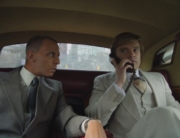In the early 1960s, Stephen Hawking met Jane Wilde while they were students at Cambridge. Shortly thereafter, he was diagnosed with motor neuron disease and given a prognosis of two years to live. In the face of this, he and Jane got married and started a family, while he pursued his ambitious goal of finding a theory that could unify quantum mechanics and general relativity.
Over the years, which Hawking doggedly lived through, his relationship with Jane became nearly as complex and hard to describe as the physical phenomena he tried to render into mathematics. Theirs was not a perfect marriage, but one where both partners stayed true to their commitment even through hardship. Jane dressed and fed her husband. She picked him up and carried him, and put her studies on hold.
In the end, the hypothesis underlying The Theory of Everything is less about reconciling black holes and quarks than it is an attempt to balance love and its many obstacles. At least this should have been the emphasis, but the film tries to serve three masters and does disservice to all. At once it is a love story, a depiction of a man wrestling with disease, and the legend of a genius cutting a blaze trailing path.
As for the latter, Stephen Hawking’s math is too complex to render in detail here, though simplified versions of some of his contributions are offered. In terms of portraying his disease, Redmayne is certainly up to the task. While his physical technique in showing a man losing control of his muscles is exquisite, it may be his vocal work that impresses most. When Stephen tells his adviser (a sturdy David Thewlis) that he wishes “to prove with a single equation that time had a beginning,” the desire is all the more affecting for the hurdles that he must overcome to communicate it.
Indeed, Eddie Redmayne’s accuracy of performance is so thorough, the details so raw, that at times it is too hard to watch. So, too, did many wish to look away when Jane Hawking published Music to Move the Stars, her unflinching and unflattering account of life with Stephen. The truth of all that has existed between Stephen and Jane is too complicated, but Theory reduces it for the tidy narrative of celebrity, particularly in the opening scenes. Little evidence is given of what drew these two people together in the first place, other than some flirty interactions which become romanticized versions of Jane’s recollections. The two never kissed during a waltz on a bridge, for instance, though it makes a lovely visual.
It’s left to Felicity Jones to use her talent to find the strength, love, and need in Jane not always present in the script. Jones has the unenviable task of playing a woman increasingly frustrated by her marriage to a famous and beloved figure. That she manages to do so while remaining sympathetic is a testament to her skill. Further, the progression of her character over several decades is necessarily more invisible, but no less convincing, than Redmayne’s.
To be fair, The Theory of Everything can be partially commended for not completely whitewashing the lives of its subjects, as did a certain Oscar-winning film about another brilliant mathematician. Here a marriage is shown which starts out as one plus one, then divides and doubles, and still manages to equal the original two. Such is sometimes the calculus of the heart. Yet the story does not go far enough, either emotionally or chronologically. In fact, the narrative of Stephen and Jane is still dramatically unfolding. After a turbulent 10-year separation, a reconciliation was made, which prompted Jane to revise her memoir, giving it the new title Traveling to Infinity.
But movies must have an ending, and this one is artful. As Stephen looks at his children happily playing, one realizes that his life has mirrored his work. Both deal with the mystery of creation, of things beginning and ending, and are full of contradictions and reversals. The cosmos and the heart can be equally baffling, but both may ultimately be governed by a single elegant equation, though it may lie beyond our power of articulation.







Leave A Comment